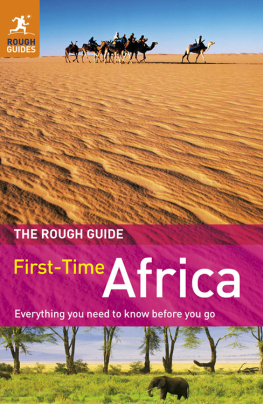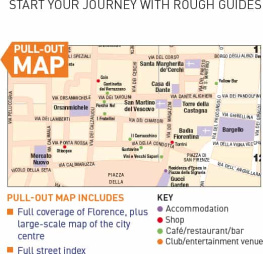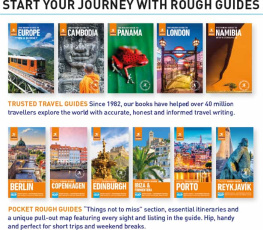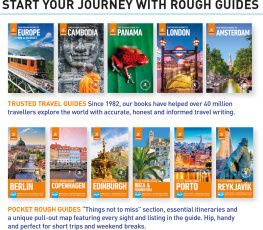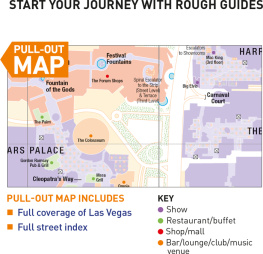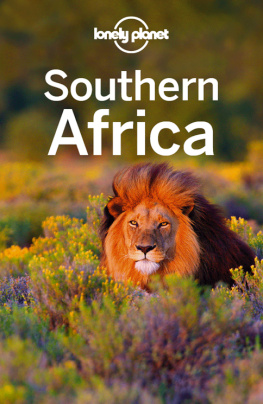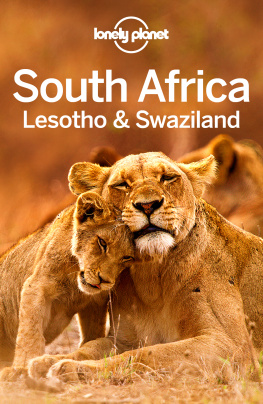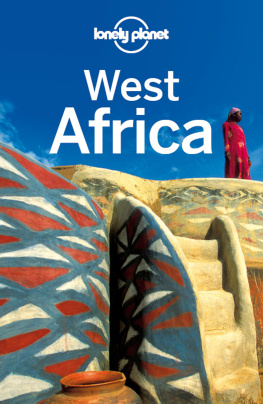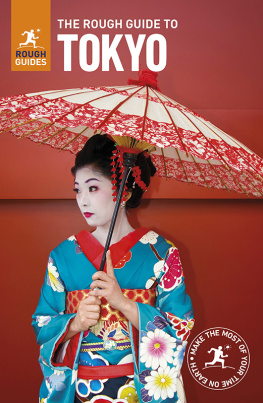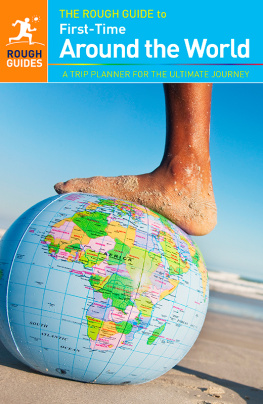How to Use this Rough Guide ePub
This Rough Guide is one of a new generation of informative and easy-to-use travel-guide eBooks that guarantees you make the most of your visit before, during and after your stay. Use this eBook both to plan your trip and explore your destination when visiting. So, before you depart, check out the illustrated Introduction, plan your itinerary using the wealth of suggestions on offer, or simply browse the guide and be inspired.
The best way to explore this guide is to begin at the main table of contents. The first section of the eBook gives you a flavour of the destination, with must-see sights and suggested itineraries. This is followed by: the Basics essential practical information; the best sights, area by area; listings on everything from hotels and restaurants to festivals; and Contexts, the history of the destination and its presence in popular culture.
Shorter contents lists appear at the start of every section in the guide, and are designed to make chapter navigation quick and easy. You can jump back to these by tapping the chapter-heading links that sit with an arrow icon at the end of every article.
Every area of the destination has a clear and beautifully presented map. Depending on your hardware, you will be able to double-tap on the maps to see larger-scale versions fill your screen.
As you use this guide, youll notice that some entries are marked by a small Rough Guides running man icon; this denotes the authors picks. You can select your own favourites and create a personalized itinerary by bookmarking the sights, venues and activities that are of most interest, giving you the quickest possible access to everything youll need for your time away.
Introduction to First-Time Africa
Africa is a compelling destination for adventurous travellers. Its roadless rainforests and radiant savannas are some of the worlds most spectacular ecosystems and the wildlife extravaganza in the safari heartlands can be overwhelming, surrounding visitors with a panorama of animals, from elephants to lion prides and giant ostriches to brilliant weaverbirds. Yet while travellers may come mostly to witness Africas natural assets, they often leave most impressed by its cultural ones: music and dance, remote communities, old kingdoms, traditional architecture and dress, and the sheer ebullience and good grace of people in the face of hardships that would crush most visitors. That spirit adds extra resonance to Africas huge appeal: nothing can equate to your experiences here.
Indeed, your first day or two may be rather intense, especially if you start in a city, as you adjust to the heat and the culture shock. It can be disturbing to come face to face with serious poverty in the shape of beggars and street children, jarring to find yourself in streets used as living spaces, laundries and toilets, and disconcerting to find that, being a relatively rich and in some places highly unusual visitor, youre the focus of attention wherever you go. Be prepared at the beginning to grit your teeth and put up with whatever each day brings.
As soon as you get out on the red earth roads and ribbons of tarmac, or start exploring Africas wide, brown rivers, great lakes, deserts, alpine peaks and coral seas, youll discover what hooks people about the continent. The sights, sounds and smells of waking before dawn on the sandy banks of the Niger, spending a night in the Central African rainforest, stopping in the silent heat of the Sahara for prayers and a snack, waiting as the dry earth of the plains is quenched by a tropical downpour, watching shooting stars from the roof of a mud-brick house will stay with you for a lifetime. And the sheer diversity of peoples and languages can be hard to keep up with: you can pass, often in a matter of hours, from the tribal homeland of herders in traditional dress to densely cultivated farms populated by a different tribe, speaking a different language, to a lakeside district of fishing people and traders, speaking yet another language, and with equally different customs.
Coming from a homogenous society to this ethnic and cultural diversity can be intoxicating: many visitors soon find themselves trying out local languages and wanting to learn more about customs and history.
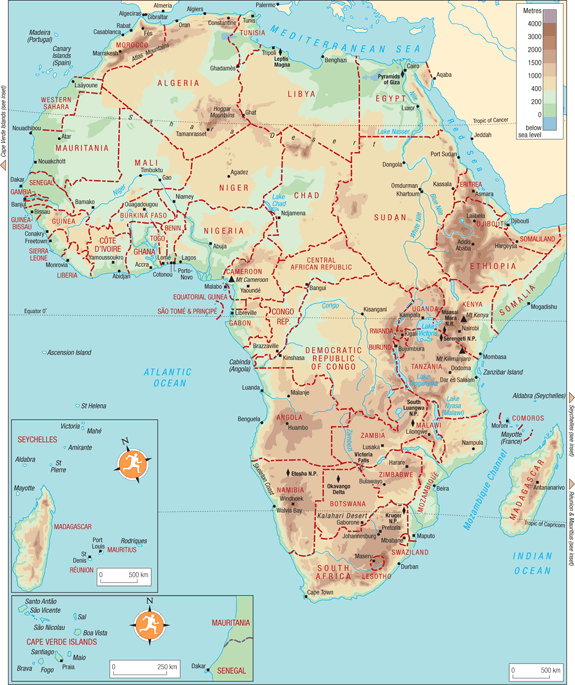
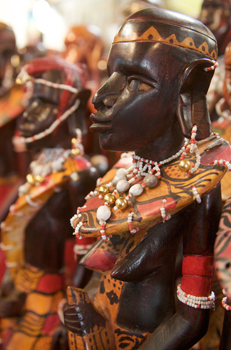
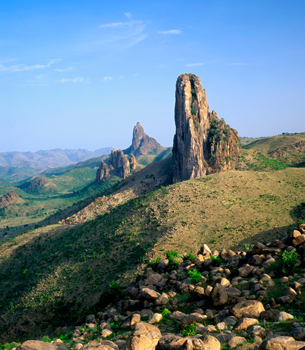
The Mandara Mountains, Cameroon
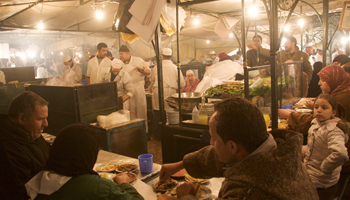
Food stalls at Marrakeshs famous Djemaa el Fna
Will it break the bank?
African countries may be poor, but theyre not particularly cheap. Try to visit with too little money and youll be disappointed at the limitations imposed on what you can do. With careful planning, you can still travel affordably: just dont expect to do it on US$10 a day.
If, like many visitors, you book an organized trip, youll quickly discover that the range of options and prices is mind-boggling. If youre based in the UK, then with just two weeks to play with, you could grab a Moroccan beach holiday for 400 (US$650), a Kenyan safari and beach trip for 1500 (US$2500) or a spot of rustic luxury in Mozambique for around 5000 (US$8000), including flights. Flying from North America will add significantly to prices a return ticket can easily cost over US$1500.
Of course, you could make your own way around. We estimate minimum in-country budgets in Where to go, but you may prefer to allow more, particularly if youre travelling on your own (the budgets are per person for two people travelling together) or if youll be country-hopping or visiting the pricier areas in peak season. Youll often pay more in less-visited countries thanks to poor infrastructure and limited accommodation options, while popular destinations such as Morocco, Egypt and South Africa can be good value. Experiences such as gorilla-trekking or chilling out in a gorgeous eco-lodge, meanwhile, can cost a bomb and be utterly unforgettable.
Planning the big trip
As the authors of this guide, we hadnt thought much about our first trips to Africa. One of us sketched out an epic, year-long adventure, aiming to take public transport from The Gambia right down to the south, but in the end West Africa proved so interesting that she spent her entire time there instead. The other took off from England one Friday with a plan to hitch-hike to Timbuktu, getting to the fabled city, and home again, largely by good luck and the kindness of others, having learned what a visa is, and what malaria feels like.
Both of us could have done with reading a book like this. It is full of the practical advice and, we hope, wisdom absorbed from a combined fifty years of visiting Africa, studying its languages, cultures and wildlife, writing guidebooks and articles and travelling with our families. We havent been absolutely everywhere, but between us weve covered most of Africa. And we keep going back for more, because the continent is endlessly absorbing and still full of mysteries.
This is a trip-planning guide, intended to get you ready. You might take it or pages from it with you, but youll need extra maps and guidebooks for the actual journey. The main idea here is to get you to the point where you know where youre going and what youre aiming to do.

